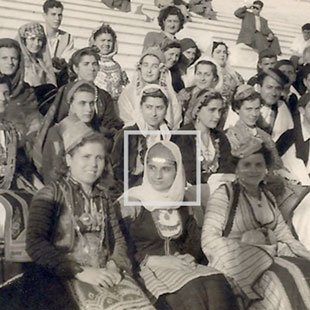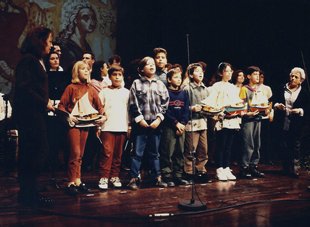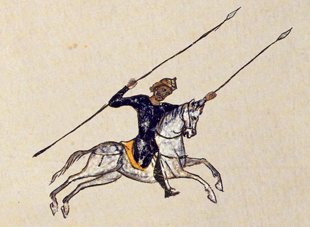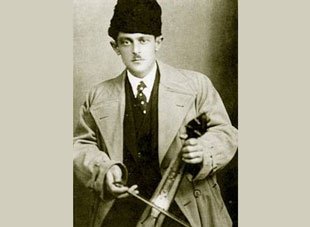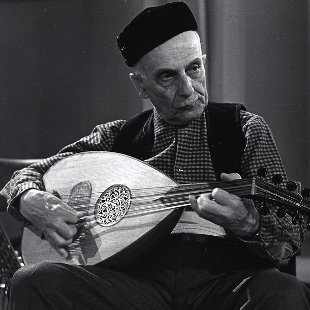You are at: Home page Her Work Press Clippings and Interviews Samiou: Tradition's Treasure
Samiou: Tradition's Treasure
Maria Paravantes, Newspaper, Athens' News, 20/11/1999
Text
Seventy-two years old and still going strong is perhaps the best way to describe singer Domna Samiou. Few seem to have the determination, diligence and energy she has. A single smile and you'll be carried away into her magical world of music. A single song, and you'll find yourself somewhere in a remote village of rural Greece under a huge oak listening to the running water and chirping birds.
For some 50 years Samiou has been collecting, recording and singing Greek folk songs. Just months before the turn of the century, critics, teachers, anthropologists and sociologists are finally beginning to realise the significance of our cultural heritage, one that goes back to Byzantine times. Had Samiou not visited this land's isolated villages back in the Fifties urging the locals to sing, Greek folk song would have faded in time as did the vibrant communities that once called the Greek countryside 'patrida' - home.
Her contribution is truly inestimable. Realising this, the Mégaron Mousikís paid tribute to this living legend by organising a concert last year on the occasion of Samiou's 70th birthday. 'This initiative gave me moral satisfaction. It only showed that the Megaron appreciated my years-long attempt to preserve and promote folk music', Samiou told the press last Thursday.
A large part of that October 29,1998 concert was recorded and released on CD last week. Domna Samiou at the Megaron Mousikis is a co-production of the Domna Samiou Folk Music Association and the Athens Concert Hall Organisation and features some of the concert's greatest moments.
But what can one say about Samiou? Born in 1928 to parents from Asia Minor, Samiou grew up influenced by her diverse surroundings. History was in the making. At 13 she attends the Society for the Dissemination of National Music, where she takes lessons from Simon Karras, a prominent figure behind the preservation and promotion of Byzantine and folk music. In 1954-1971 she works for EIR, Greek Radio, where among other things, she records and classifies local music traditions. 'I felt impelled to shed light on and record our distinct musical traditions in their genuine form', she said, referring to the impure renditions that were slowly becoming popular abroad.
In I960 Samiou's records are available in Greece, France and Sweden. In the meanwhile, she collaborates with Greek television and produces - on a shoe-string budget - A Musical Travelogue, an impressive (considering the times and means available) documentary series which followed Samiou on the road. She (and her crew) would visit numerous parts of Greece, attend local celebrations or go by the kafeneíon and invite villagers to sing. 'The difficulty in recording Greek folk song', Samiou has said, 'lied in the fact that most of these songs were never chronicled. They have been passed down through word of mouth from generation to generation'.
In 1971 Samiou makes her debut appearance beside Dionysis Sawopoulos at the central Athens Rodeo Club, where she sings Karaghiozis, 'together on one mike', she points out, and Lianohortaroudia, a song from Thrace which inspired Sawopoulos to write his successful Mavri Thalassa. In 1981 she establishes the Domna Samiou Folk Music Association whose goal is to classify and present the nation's folk tradition in its original form. She later works for the theatre but at the same time continues to laboriously document Greek music, most of which she records on albums, among them the fascinating Ta Apokriatika (Carnival Songs) which featured tunes sung in Greece during Apokries (carnival season). The songs she selected carry within the Dionysaic influences evident in their explicit lyrics. Other collections she's worked on include Kaneloriza, Mikrasiatika Tragoudia (Songs from Asia Minor), Tragoudia tis Xenitias (Songs about Greeks far from home) and her 1998 Paschaliatika (Easter Songs). But in that time, Samiou has also passed on the secrets of her art to younger generations through her teaching at the Museum of Folk Instruments in Plaka.
Domna Samiou at the Megaron features 'songs that I can't present in summer concerts because I didn't want to lessen their value. These are songs of love, meant to be heard attentively and I felt the Megaron was the best place for these to stand out'. On that magical night last year, Samiou had invited two friends, Savvopoulos, 'because I owe him my first appearance before an audience' and much-loved Eleftheria Arvanitaki 'because she sings the rembetiko from the heart, and if I had not dedicated myself to demotika (folk), today I would have been a rembetissa'. And indeed, Samiou's interpretation of the Asia Minor song Tha Spaso Koupes (You dare to speak like that) sounds as if its been lifted from a Sellak 78 of times past.
'There is a song that says 'Boundaries love knows not' and in that fashion, 'boundaries art knows not'. That's why I invited Turkey's Fahrettin Çimenli and Volkan Yilmaz to add to the colour of our song', Samiou told the press, stressing the 'very young' musicians that accompanied her.
Domna Samiou at the Megaron Mousikis is definitely a welcome addition to any collection, especially to that of a foreigner living in Greece. It is an excellent sample of genuine Greek song, the kind we rarely hear nowadays. Accompanying the CD is an illustrated booklet with information on Samiou as well as the songs' lyrics which have faithfully been translated into French and English.
Only by listening to her sing can one truly realise her gift. Her crystal clear vocals embody all the secrets that make the Greek landscape so beautiful. It seems that every single vocal mannerism of hers has some part of history lingering. That's why she can so easily trigger visual images. Samiou respects tradition, it's in her blood. Passion, spontaneity and overpowering commitment: aren't these elements what legends are made of? I dare you, ask any other singer to sing on the spot and I doubt you'll hear the divine song of Samiou we heard once again on Thursday.
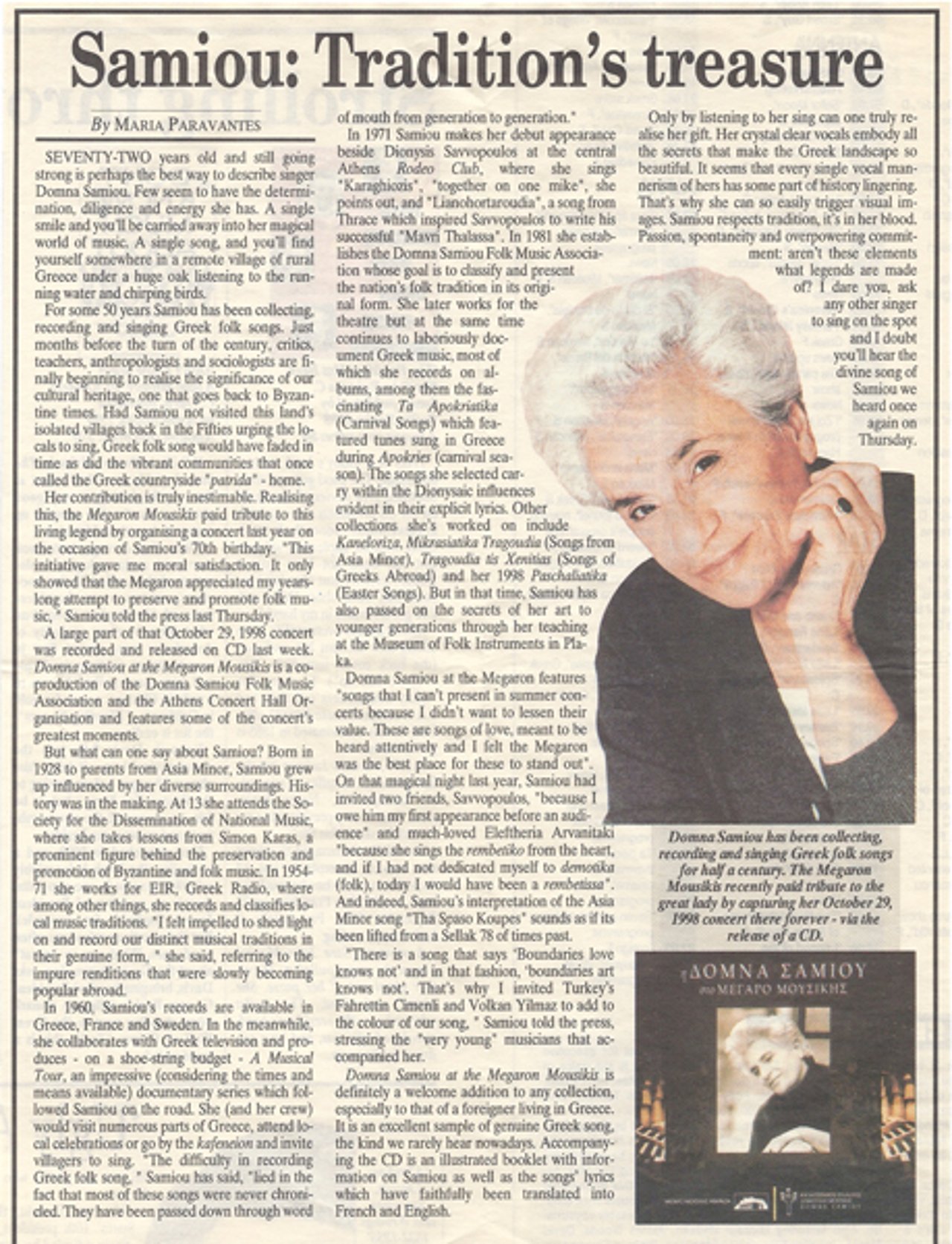
Tradition's Treasure
Maria Paravantes, Εφημερίδα, Athens news, 20 Νοεμβρίου 1999

